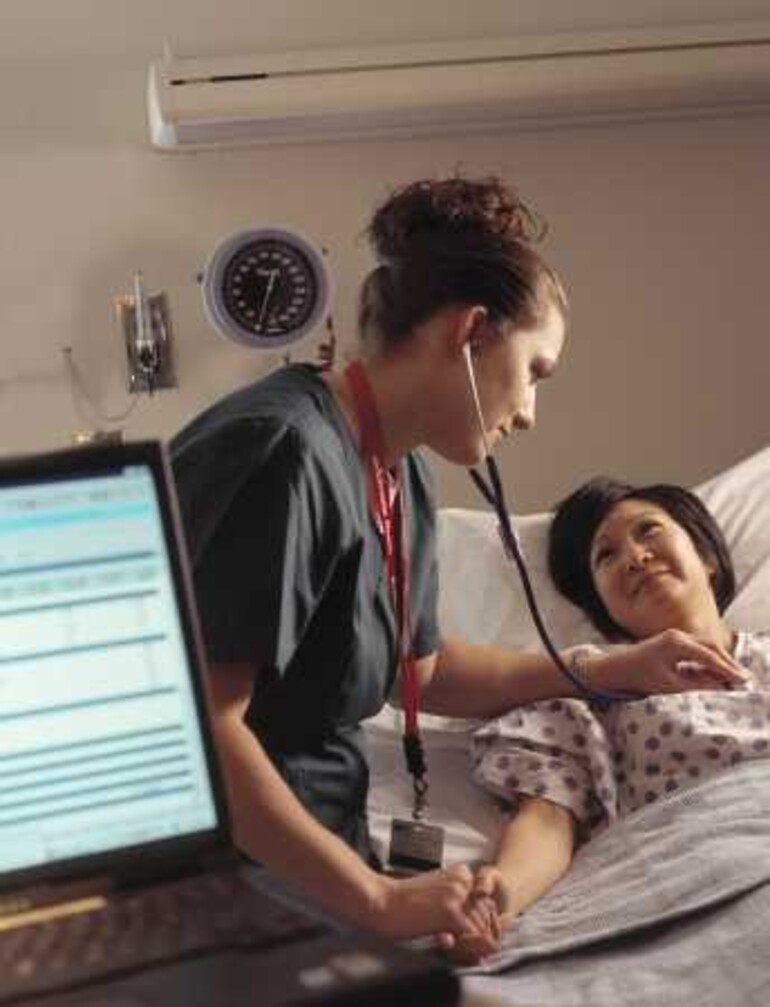It’s not often that a bad experience inspires a career. But when Renee Swanson, R.N., B.S.N., encountered a testy nurse during a childhood hospital stay, she knew she could do better. And she has. Now a registered nurse—just as she predicted on a kindergarten questionnaire—Renee serves as the Medical Observation Unit coordinator at Adventist Medical Center (AMC) in Portland, Oregon, where she works to make a difference in the lives of her patients and co-workers. “I always try to bring out the positive, no matter how tough things get,” says an enthusiastic Renee. “Life is too short to be grumpy.”
Moving On Up
At just age 27, Renee’s career has been relatively short—but long on accomplishments. After graduating from Walla Walla College, she returned to AMC where she had spent several months working as a unit secretary while in school. Already familiar with many people and processes, the transition proved easy, and Renee soon found herself on the fast track. Likely a result of her easy laugh and approachable manner, the young nurse took on management responsibilities early—but only after gaining valuable clinical experience as an ortho-neuro, medical/surgical and, finally, house float nurse. “I’m so thankful for the opportunities I’ve been given…and the great people I work with,” Renee says of her five-year tenure at AMC. “I hope my experience shows other young people that if you work hard and maintain a positive attitude, you’ll be given a chance to do great things.”On the Cutting Edge
Indeed, Renee was given such a chance in the spring of 2002 when she was invited to participate on the design team for Project IntelliCare, a state-of-the-art clinical information system that will change the way caregivers go about their jobs in Adventist Health’s 20 system hospitals. In preparation for the July 2003 “go live,” Renee admits doing a little bit of everything. Her primary task involved training other nurses how to use the new system and transition from paper to online charting. Two months in, Renee is already enjoying the many time-saving features the new technology offers. When “frequent flyers” (repeat visitors) are admitted, she no longer has to wait hours—or worse yet, days—for their charts. Instead, their medical histories are available online with just a few keystrokes. She also spends less time tracking orders, since most are now logged online. “You really feel like you’re on the cutting edge,” says Renee of the new system. “Who knew that as a nurse I’d be working with information systems on a project like this?”“The Best Profession”
It’s surprises like this—and lots of visits to the emergency room with her accident-prone brother—that drew Renee to her career in the first place. “I’ve talked a lot of people into nursing because it offers so many avenues,” she says. “You can be involved in patient care, administration or education. And along the way, you get to make a difference in someone’s life. Not everyone can say that.”It’s not often that a bad experience inspires a career. But when Renee Swanson, R.N., B.S.N., encountered a testy nurse during a childhood hospital stay, she knew she could do better. And she has.
Now a registered nurse—just as she predicted on a kindergarten questionnaire—Renee serves as the Medical Observation Unit coordinator at Adventist Medical Center (AMC) in Portland, Oregon, where she works to make a difference in the lives of her patients and co-workers. “I always try to bring out the positive, no matter how tough things get,” says an enthusiastic Renee. “Life is too short to be grumpy.”
Moving On Up
At just age 27, Renee’s career has been relatively short—but long on accomplishments. After graduating from Walla Walla College, she returned to AMC where she had spent several months working as a unit secretary while in school. Already familiar with many people and processes, the transition proved easy, and Renee soon found herself on the fast track. Likely a result of her easy laugh and approachable manner, the young nurse took on management responsibilities early—but only after gaining valuable clinical experience as an ortho-neuro, medical/surgical and, finally, house float nurse. “I’m so thankful for the opportunities I’ve been given…and the great people I work with,” Renee says of her five-year tenure at AMC. “I hope my experience shows other young people that if you work hard and maintain a positive attitude, you’ll be given a chance to do great things.”On the Cutting Edge
Indeed, Renee was given such a chance in the spring of 2002 when she was invited to participate on the design team for Project IntelliCare, a state-of-the-art clinical information system that will change the way caregivers go about their jobs in Adventist Health’s 20 system hospitals. In preparation for the July 2003 “go live,” Renee admits doing a little bit of everything. Her primary task involved training other nurses how to use the new system and transition from paper to online charting. Two months in, Renee is already enjoying the many time-saving features the new technology offers. When “frequent flyers” (repeat visitors) are admitted, she no longer has to wait hours—or worse yet, days—for their charts. Instead, their medical histories are available online with just a few keystrokes. She also spends less time tracking orders, since most are now logged online. “You really feel like you’re on the cutting edge,” says Renee of the new system. “Who knew that as a nurse I’d be working with information systems on a project like this?”“The Best Profession”
It’s surprises like this—and lots of visits to the emergency room with her accident-prone brother—that drew Renee to her career in the first place. “I’ve talked a lot of people into nursing because it offers so many avenues,” she says. “You can be involved in patient care, administration or education. And along the way, you get to make a difference in someone’s life. Not everyone can say that.”Now a registered nurse—just as she predicted on a kindergarten questionnaire—Renee serves as the Medical Observation Unit coordinator at Adventist Medical Center (AMC) in Portland, Oregon, where she works to make a difference in the lives of her patients and co-workers. “I always try to bring out the positive, no matter how tough things get,” says an enthusiastic Renee. “Life is too short to be grumpy.”
Moving On Up
At just age 27, Renee’s career has been relatively short—but long on accomplishments. After graduating from Walla Walla College, she returned to AMC where she had spent several months working as a unit secretary while in school. Already familiar with many people and processes, the transition proved easy, and Renee soon found herself on the fast track. Likely a result of her easy laugh and approachable manner, the young nurse took on management responsibilities early—but only after gaining valuable clinical experience as an ortho-neuro, medical/surgical and, finally, house float nurse. “I’m so thankful for the opportunities I’ve been given…and the great people I work with,” Renee says of her five-year tenure at AMC. “I hope my experience shows other young people that if you work hard and maintain a positive attitude, you’ll be given a chance to do great things.”On the Cutting Edge
Indeed, Renee was given such a chance in the spring of 2002 when she was invited to participate on the design team for Project IntelliCare, a state-of-the-art clinical information system that will change the way caregivers go about their jobs in Adventist Health’s 20 system hospitals. In preparation for the July 2003 “go live,” Renee admits doing a little bit of everything. Her primary task involved training other nurses how to use the new system and transition from paper to online charting. Two months in, Renee is already enjoying the many time-saving features the new technology offers. When “frequent flyers” (repeat visitors) are admitted, she no longer has to wait hours—or worse yet, days—for their charts. Instead, their medical histories are available online with just a few keystrokes. She also spends less time tracking orders, since most are now logged online. “You really feel like you’re on the cutting edge,” says Renee of the new system. “Who knew that as a nurse I’d be working with information systems on a project like this?”“The Best Profession”
It’s surprises like this—and lots of visits to the emergency room with her accident-prone brother—that drew Renee to her career in the first place. “I’ve talked a lot of people into nursing because it offers so many avenues,” she says. “You can be involved in patient care, administration or education. And along the way, you get to make a difference in someone’s life. Not everyone can say that.”Now a registered nurse—just as she predicted on a kindergarten questionnaire—Renee serves as the Medical Observation Unit coordinator at Adventist Medical Center (AMC) in Portland, Oregon, where she works to make a difference in the lives of her patients and co-workers. “I always try to bring out the positive, no matter how tough things get,” says an enthusiastic Renee. “Life is too short to be grumpy.”
Moving On Up
At just age 27, Renee’s career has been relatively short—but long on accomplishments. After graduating from Walla Walla College, she returned to AMC where she had spent several months working as a unit secretary while in school. Already familiar with many people and processes, the transition proved easy, and Renee soon found herself on the fast track. Likely a result of her easy laugh and approachable manner, the young nurse took on management responsibilities early—but only after gaining valuable clinical experience as an ortho-neuro, medical/surgical and, finally, house float nurse. “I’m so thankful for the opportunities I’ve been given…and the great people I work with,” Renee says of her five-year tenure at AMC. “I hope my experience shows other young people that if you work hard and maintain a positive attitude, you’ll be given a chance to do great things.”On the Cutting Edge
Indeed, Renee was given such a chance in the spring of 2002 when she was invited to participate on the design team for Project IntelliCare, a state-of-the-art clinical information system that will change the way caregivers go about their jobs in Adventist Health’s 20 system hospitals. In preparation for the July 2003 “go live,” Renee admits doing a little bit of everything. Her primary task involved training other nurses how to use the new system and transition from paper to online charting. Two months in, Renee is already enjoying the many time-saving features the new technology offers. When “frequent flyers” (repeat visitors) are admitted, she no longer has to wait hours—or worse yet, days—for their charts. Instead, their medical histories are available online with just a few keystrokes. She also spends less time tracking orders, since most are now logged online. “You really feel like you’re on the cutting edge,” says Renee of the new system. “Who knew that as a nurse I’d be working with information systems on a project like this?”“The Best Profession”
It’s surprises like this—and lots of visits to the emergency room with her accident-prone brother—that drew Renee to her career in the first place. “I’ve talked a lot of people into nursing because it offers so many avenues,” she says. “You can be involved in patient care, administration or education. And along the way, you get to make a difference in someone’s life. Not everyone can say that.”Now a registered nurse—just as she predicted on a kindergarten questionnaire—Renee serves as the Medical Observation Unit coordinator at Adventist Medical Center (AMC) in Portland, Oregon, where she works to make a difference in the lives of her patients and co-workers.
“I always try to bring out the positive, no matter how tough things get,” says an enthusiastic Renee. “Life is too short to be grumpy.”
At just age 27, Renee’s career has been relatively short—but long on accomplishments. After graduating from Walla Walla College, she returned to AMC where she had spent several months working as a unit secretary while in school.
Already familiar with many people and processes, the transition proved easy, and Renee soon found herself on the fast track. Likely a result of her easy laugh and approachable manner, the young nurse took on management responsibilities early—but only after gaining valuable clinical experience as an ortho-neuro, medical/surgical and, finally, house float nurse.
“I’m so thankful for the opportunities I’ve been given…and the great people I work with,” Renee says of her five-year tenure at AMC. “I hope my experience shows other young people that if you work hard and maintain a positive attitude, you’ll be given a chance to do great things.”
Indeed, Renee was given such a chance in the spring of 2002 when she was invited to participate on the design team for Project IntelliCare, a state-of-the-art clinical information system that will change the way caregivers go about their jobs in Adventist Health’s 20 system hospitals. In preparation for the July 2003 “go live,” Renee admits doing a little bit of everything. Her primary task involved training other nurses how to use the new system and transition from paper to online charting.
Two months in, Renee is already enjoying the many time-saving features the new technology offers. When “frequent flyers” (repeat visitors) are admitted, she no longer has to wait hours—or worse yet, days—for their charts. Instead, their medical histories are available online with just a few keystrokes. She also spends less time tracking orders, since most are now logged online.
“You really feel like you’re on the cutting edge,” says Renee of the new system. “Who knew that as a nurse I’d be working with information systems on a project like this?”
It’s surprises like this—and lots of visits to the emergency room with her accident-prone brother—that drew Renee to her career in the first place.
“I’ve talked a lot of people into nursing because it offers so many avenues,” she says. “You can be involved in patient care, administration or education. And along the way, you get to make a difference in someone’s life. Not everyone can say that.”








